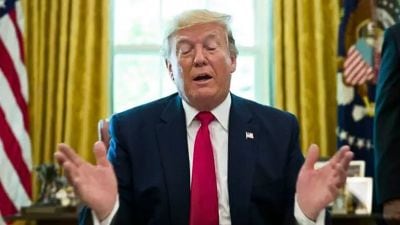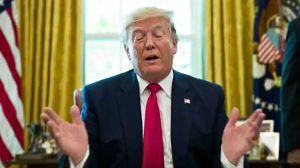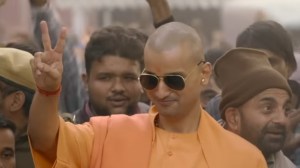‘Nobody will trade minister’s post for party post. The power of a minister to dispense favour and amass wealth is immense’
Prithviraj Chavan, Union Minister of State in the PMO, is a graduate from BITS, Pilani, and has a masters from Berkeley. He is the Congress general-secretary in charge of Arunachal, Sikkim, Manipur, Jammu & Kashmir, and Karnataka, where the party was recently drubbed in the Assembly elections. In an interaction with Express staff, moderated by Editor (ENS) Shishir Gupta, he speaks about what the Congress learnt from the Karnataka loss, taking reforms further, and the general elections ahead

PRITHVIRAJ CHAVAN: For me, the Karnataka elections were a great experience. The average MP, particularly a Lok Sabha one, usually has a narrow vision — you do not see anything beyond your own constituency because it does not bring you any political dividend.
The election result did not meet our expectations. We expected to be the largest single party, if not win the absolute majority. I did not realise that Karnataka was so caste-ridden and communally divided. It surprised me to learn about all the castes and sub-castes and that we must provide tickets for all the sub-castes. Everybody had to be appeased.
There’s another thing I learnt: people say elections in Andhra Pradesh and Maharashtra are expensive, but nothing prepared us for what we saw in Karnataka. Here, money really mattered and it produced results.
•VANDITA MISHRA: Congress is one of the oldest players in Karnataka politics and has played the caste game all these years. So why do you say you were surprised by the caste divisions?
What surprised me and other Congress leaders who had come from outside the state was the intensity of caste feelings. Not only the castes but the sub-sub-castes. For example there are 27 sub-castes of Lingayats, four or five of Vokkaliggas. So what happened in the ticket distribution is that in order to balance this caste ratio, merit suffered. If you set a quota for a certain community then you had to meet the number even if there was a better candidate from another community.
•SUMAN K. JHA: The Congress party’s post-mortem of Gujarat found that inducting rebels did not help the party and that not projecting a candidate as chief minister was a big mistake. Do you think, the Congress committed the same mistakes in Karnataka?
In Gujarat, we specifically tried woo BJP rebels, with the understanding that we would try to break into the Patel community which is supposedly a BJP stronghold. We had nothing to lose if we gave seats to those who migrated to us because the seats were not ours in the first place. It didn’t work out. We learned from the experience and made a point not to touch any BJP rebel in Karnataka — except for one MLA.
•SUMAN K. JHA: What about not projecting a CM candidate?
The Congress does not project a leader — particularly when it is in opposition. We did not do it for Gujarat either. Karnataka was an important election. We had to put everything that we had, all our assets and leaders had to be in fray. That brings us to S.M. Krishna. He was keen to return to active politics. A very calculated decision was taken to use Mr Krishna in the campaign with the understanding that he would not contest the elections. We made him chairman of the election monitoring and coordination committee, based in Bangalore.
I believe that in Karnataka, which is very caste and community divided society, if you name one person, his community gets projected at the expense of others. For instance, there are two major communities, the Vokkaligas and the Lingayats. Two major parties — JD (S) and BJP — had one leader each belonging to these communities.
Our social base since the time of Devraj Urs comprises Dalits, Muslims, OBCs and the forward castes. It was an inclusive social coalition. That was disturbed in 2004 when JD(S) came forward and then, there was Mr Hegde, too. Both formations, Congress and the Janata Dal, were fighting for the same coalition.
In this election, we had Mr Kharge as the state unit president; he belongs to a Dalit community and is a very senior leader. The question before us was — how do we use Mr Krishna? If he contested the elections, whether you like it or not he would be the chief ministerial candidate. In which case what about Mr Kharge?
Our thinking was that we should convert this election into a two-party election, wish away the JD(S) and rebuild our social coalition. But our coalition was being poached by JD(S), BSP and other parties. So, on balance, not projecting any one person as CM also meant we were not projecting any one community. In the Karnataka context I think it was the right decision.
•SHISHIR GUPTA: Did the rise in prices and your handling of terrorism have an impact on the elections?
The entire BJP campaign was based on only these two issues. The increase in inflation indices during the campaign period did not help us. The Jaipur blast definitely did not help at all. We have a record of handling inflation better than other countries in a similar situation and argued that we were trying to handle prices. But that was a defensive statement and the price indices continued to go up.
SHISHIR GUPTA: The BJP did not campaign on any communal issue. For the first time the Election Commission ensured there were no buntings or banners. There was huge, silent majority who decided to vote for BJP — doesn’t that concern the Congress?
It is certainly a cause of concern for Congress. But I do not agree that BJP did not play the Hindutva card. They played it very subtly by projecting Narendra Modi. Mr Modi said I will give you a Gujarat model of development if you vote BJP. That kind of subtext was always there. But I am not taking away anything from the BJP’s win — people did vote for them.
•UNNI RAJEN SHANKER: In an interview to The Indian Express, S.M. Krishna had pointed at three factors: no projection of a chief ministerial candidate, wrong selection of candidates and no clarity in strategy. What about the latter?
We went into these elections talking about development and stability. The people of Karnataka seem to have paid heed to the issue of stability. Compared to 2004, when there were 22 independent small party candidates, this time there was no small party candidates. Only six independent candidates won, four of them Congress rebels, one JD(S) and one BJP. But what surprised me most was that despite our appeal to vote for two parties, in other words, not to vote for JD(S), it got the same support as earlier. This is quiet alarming as it fragments our social base. We met the BSP challenge by having a Dalit leader in Mr Kharge. So I do not think we had unclear strategy. The only thing is that we did not project a chief ministerial candidate and I have already addressed that issue.
•SEEMA CHISHTI: You are into general elections in less than a year. What is the one big lesson you take from the Karnataka elections?
Merit. Select a candidate only on merit. This entire artificial quota business, no matter howsoever desirable, does not yield results.
•SUMAN K. JHA: The Future Challenges Committee of the Congress has said that the quota system has to be removed, the candidate selection committee has to be streamlined. Were they applied to Karnataka?
We did set up some guidelines — that people who have lost by wide margins should be denied tickets in future elections, even very senior leaders. We also had an internal guideline that no relation of a Congress leader would be given a ticket only on the basis of his relationship.
•COOMI KAPOOR: Some people in the Congress feel that this practice of outside leaders selecting the state candidates and running the state campaign is detrimental since these leaders do not know local factors. Comment.
We had a democratic process. We had a candidate selection committee of 35 members. Every section of the Karnataka leadership invited applications. Then they sieved through the applications. The entire committee met and fine-tuned the selection. They discussed the names, a lot of unpleasant things were said, there were heated arguments. But there was no unanimous list. We sat with the Karnataka leaders to solve the problems but the ultimate decisions were made by local leaders. The role played by the screening committee was only to the extent of introducing certain factors like the number of women candidates. Left to the local leaders, not a single women candidate would have got ticket. The same thing would have happened to minority candidates. The outsiders merely played the role of umpires.
•D.K. SINGH: In UP you lost the Dalit vote bank to Mayawati. In Karnataka, out of 36 seats reserved for Scheduled Castes, you won only 10, despite the fact that Kharge was there. What went wrong?
That is an entirely wrong assessment of the situation. In Dalit constituencies, the average population of Dalits, in most places, is 16 per cent. That means between 75-80 per cent are non-Dalits in even those constituency. No SC-reserved seat is decided by Dalits alone. What has probably happened is that other forward communities did not respond to our candidates. Or we lost also because of a division in the Dalit community itself.
•P. VAIDYANATHAN IYER: This political strategy of accommodating everybody when allocating seats, does it also extend to economic issues? In last three years we have not seen any significant reforms by the Congress-led government.
We tend to define economic reforms in terms of financial reforms, pension reforms, pushing the stock market and so on. Major economic reform lies in rural development. The employment guarantee scheme is probably the biggest economic reform we can think of. But we do not call it economic reform. I think we have taken revolutionary steps for empowerment of have-nots — the poor. We have introduced a whole plethora of social security schemes. And we have not increased the prices of food grains.
When we talk of growth rate of 9 per cent, let us analyse the growth rate. Agriculture is growing at 2 percent, and now 3 per cent. Or take the Backward Region Grant Fund. Certain regions are not attracting investment, so special packages for the North East and Kashmir have been given.
•P. VAIDYANATHAN IYER: What stops you from carrying out other reforms?
I accept that certain reforms like financial reforms, pension reforms, and insurance reforms have been stalled by the Left. We have not been able to do certain regulatory reforms that a free market society demands. We have gone to great distances, in the telecom and energy sectors, but in other sectors we have not been able to do so. Many places and many times the Left have stopped us.
•RAVISH TIWARI: After the Karnataka results what is the Congress’s resolve on the nuclear deal?
The fact is that the Indo-US nuclear deal is an international agreement and not merely a bi-polar or bilateral agreement. We have to go ahead with civilian nuclear energy as part of our energy basket. We need every mega watt of electricity whether it is solar, wind coal, thermal or any other fancy source of electricity.
Nuclear energy is completely mastered by us and we are in position to sell it to the world. If we had fuel we could expand the programme dramatically. Right now there is a temporary mismatch between our requirement and what we are producing. Our nuclear plants are performing below capacity. If we are able to get into civilian nuclear cooperation with the rest of the world we would be able to increase our production manifold. Whether it is climate change or global warming, nuclear energy is desirable. We spoke frankly to the Left on the desirability of nuclear energy. Every meeting that we have reduces the distance between us and Left. So if we had enough time we would bridge these differences. But elections are coming soon. There are elections in the USA also. The Congress Party is completely behind the deal. A call has to be taken whether the party is ready to go over the Left’s head to sign the deal.
•AMITABH SINHA: How serious is the uranium shortage? Will our nuclear power plants shut down because of uranium shortages?
We have limited resources of uranium. We have known reserves to run a 10,000 KW programme of nuclear energy for 40 years. They are known reserves not yet out of the ground. We have mines in Jharkhand. There is a new initiative in Andhra Pradesh, a few mines in Karnataka have also been discovered. But the major mine is the KPM mine in Meghalaya which has been pending environmental clearances. The mine includes the known reserves that we have already calculated. Once that comes up we will be more comfortable.
•SONU JAIN: What is the government’s view on the proposed investment by Dow in India? Do they not share liability for the Union Carbine Gas tragedy? And why has the Prime minister not given an appointment to the Bhopal gas tragedy activists for the last two months?
The prime minister directed me to meet them. I met them and received their memorandum. The government has agreed to their main demand to set up a commission. We have also given Rs 14 crore for drinking water facilities in 14 colonies. The second demand was that medical research should continue. We have directed ICMR to continue with the research. The next issue is Dow’s liability. We have already filed a demand in the court that they should deposit Rs100 crore immediately. There were reports that Dow has obtained permission by the authorities to use a certain pesticide by illegal means. That is being looked into by the appropriate ministry. The second report was that there is a technology transfer agreement between a certain Indian company and Dow in Gujarat. That is a matter between the Petroleum Ministry and the Foreign Investment Board. I should add that the Bhopal gas tragedy activists have now ended their dharna.
•RITU SARIN: The prime minister has said that we need a federal agency to investigate terrorism and other related issues. Has the CBI made a pitch for it?
I think the country as a whole will have to take a call on the federal agency. There are issues which we need to resolve, one being whether the country needs an agency like FBI. Not just for terrorism but any crime, like counterfeiting of currency, which is not a state issue.
•SEEMA CHISHTI: One thing that seems to missing in Congress is political aggression which is missing. Because S.M. Krishna wants to come back to politics you take him back on the cost of upsetting the apple cart. It is quite directionless, a situation where you have Congress president staying out of executive power. You could have used this division between party, coalition and government well. Is that also becoming part of the problem?
I think we are becoming too minister-centric in states and even at the centre. Nobody will trade a ministerial position for a party position. The power that a minister enjoys of dispensing favours, of amassing wealth and patronage is so huge that people take up party responsibility only to see that they will get ministerial berth later on. That is something we have to introspect: how to re-organise the party.
•SHAWAN SEN: What is your opinion of the Gurjjar stir and their demand for ST status?
Our constitutional position is very clear. We have the Indira Sahni judgment of the Supreme Court which does not allow us to go beyond 50 per cent reservations. If any community is to be added to the ST list, the state government has to make a specific recommendation. This is followed by a constitutional recommendation. The state government has not made that recommendation. So it has to make up its mind. The chief minister wants an additional reservation under nomadic tribes, which will exceed the 50 per cent quota but the CM claims this would be under the Indira Sahani recommendation. I think the state government is trying to muddle the issue.
•SUMAN K. JHA: Will there be a change in Mumbai Mantralay soon? Will you be heading back to Maharashtra?
If that was the case, I would not have been given the responsibilities that I have here, many of which I got very recently.
(The transcript was prepared by Shobana K.)
Photos





- 01
- 02
- 03
- 04
- 05


























